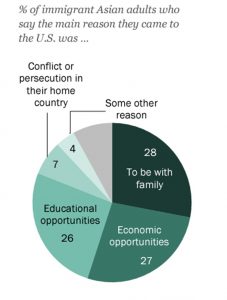A new report from the Pew Research Center, released on October 9, reveals that Korean immigrants primarily choose to move to the U.S. for economic opportunities and time with family. The study also shows that most Korean immigrants would still prefer living in the U.S. over South Korea if given the choice again.
The report, which summarizes data on Asian immigrants in the U.S., found that a majority view their lives in America positively. Among the respondents, 77% stated their “standard of living is better than that of their parents” in their home country, and 74% said they would choose to move to the U.S. again if given the opportunity.
Focusing on Korean immigrant respondents, 26% of them cited economic opportunities as a reason for immigrating, a figure higher than Chinese (16%) and Vietnamese (9%) respondents but lower than Filipino and Indian respondents (40% each). Additionally, 38% of Koreans said they immigrated to keep their families together, a figure 10% higher than responses from Indian, Chinese, and Filipino immigrants.

For Korean immigrants, only 5% said they would prefer to stay in South Korea. The top reasons for their satisfaction with life in the U.S. included ample opportunities for success (75%), a favorable environment for raising children (73%), and gender equality (68%).
However, areas of dissatisfaction for Korean immigrants included the U.S. healthcare system (21%), transparency in elections and political choice (39%), and familial bonds (17%). In these aspects, many Korean immigrants viewed South Korea as superior.
Asian immigrants are also adapting quickly to life in the U.S., with 91% agreeing that English proficiency is important for success. Sixty-four percent said they had learned English before immigrating. Among Korean respondents, however, only 48% said they could read or speak English before immigrating, lower than Indian (84%), Filipino (82%), and Chinese (57%) respondents. Twenty-seven percent of Koreans reported still struggling with English.
The Pew Research Center emphasized in the report that language barriers contribute to discrimination and difficulties in various aspects of daily life, including school and work.
Financial struggles also pose a challenge for immigrants during their early stages of settlement. Fifty-eight percent of Asian respondents said they received financial support from various sources during their first six months in the U.S., including government agencies, nonprofit organizations, religious institutions, or acquaintances.

In contrast, 51% of Korean respondents relied on financial support from family or friends, with only 9% receiving help from religious organizations, 8% from government aid, and 4% from Asian nonprofit organizations—figures lower than other Asian groups.
Less than 5% of Korean immigrants cited fleeing conflict or persecution as their reason for moving to the U.S., compared to 32% of Vietnamese immigrants.
More than half (59%) of Asian respondents said the U.S. immigration system needs major reforms, signaling strong support for changes in immigration policies.
The survey was conducted from July 5, 2022, to January 27, 2023, and included 7,006 Asian Americans, 5,036 of whom were foreign-born immigrants.
BY SUAH JANG, YOUNGNAM KIM [jang.suah@koreadaily.com]



